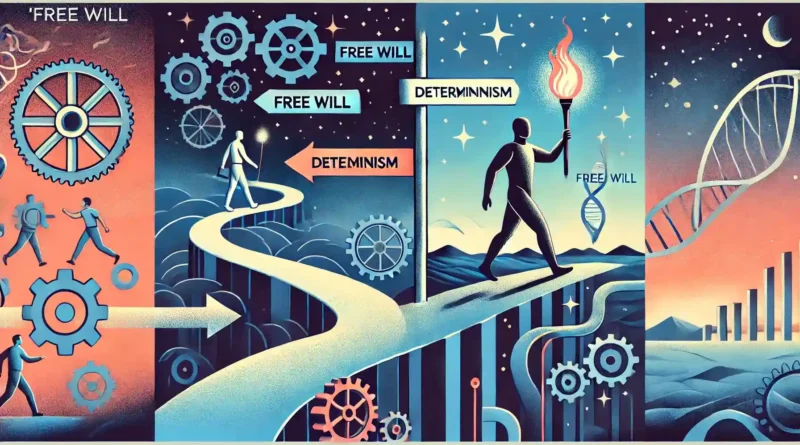The Philosophy of Freedom: Examining Free Will and Determinism
One of the most profound and debated topics in the history of philosophy is the nature of human freedom. The central issue concerns the tension between free will and determinism, two seemingly contradictory concepts. On one hand, free will suggests that individuals have the power to choose their actions independently, while on the other, determinism argues that every event or action is the result of preceding events, making true freedom an illusion. This dilemma has been at the heart of philosophical discourse for centuries, and understanding how these ideas have evolved can shed light on crucial questions regarding moral responsibility, personal agency, and the nature of human existence.
In this article, we will explore the philosophical debate surrounding free will and determinism, examining key positions, arguments, and their implications for ethics and personal freedom.
1. The Nature of Free Will
What is Free Will?
At its core, free will refers to the ability of individuals to make choices that are not determined by external factors or by prior causes. In essence, free will suggests that people have control over their actions and decisions, which allows them to be held accountable for their behavior. Free will is typically associated with the belief that individuals are autonomous agents who can shape their future based on personal decisions.
Philosophers have long grappled with defining the precise nature of free will. Does it require the possibility of choosing differently in any given situation, or is it sufficient that a person’s actions reflect their desires and intentions? Regardless of the definition, free will is deeply connected to concepts of moral responsibility—if we are free to choose, then we are also responsible for our actions.
Classical View: Libertarianism
Libertarianism (in the philosophical sense) posits that human beings possess true free will. This view argues that our decisions are not determined by previous causes, external influences, or natural laws. According to libertarians, when we make choices, we act as the originators of those actions, free from external constraints or deterministic forces. The libertarian view of free will is sometimes referred to as indeterminism, which holds that there are events (including human actions) that are not caused by prior events in a deterministic fashion.
Libertarians typically rely on the idea that moral responsibility requires free will. If people are not free to choose their actions, they cannot be held morally accountable for those actions. This position is often linked to concepts of justice, as it supports the notion that individuals should be praised or blamed based on their voluntary choices.
Psychological Perspective
From a psychological perspective, free will is often understood as the experience of making choices that reflect personal desires, preferences, or goals. Many psychologists agree that human beings have a sense of autonomy in decision-making, which is essential for personal identity and agency. While some theories suggest that our behavior may be influenced by unconscious forces, the experience of making decisions—whether consciously or subconsciously—remains a crucial aspect of human experience.
2. The Case for Determinism
What is Determinism?
Determinism is the philosophical concept that every event, including human actions, is determined by preceding events in accordance with natural laws. In a deterministic universe, everything that happens is the result of prior causes, meaning that, given the state of the world at any particular moment, there is only one possible outcome. This view contrasts with free will by asserting that all events are the necessary consequences of earlier events.
Determinism is often associated with the causal chain, where each event is connected to the preceding one. According to this view, every choice we make, every action we take, and every thought we have is the result of a long chain of events that extend back to the beginning of time.
Hard Determinism
Hard determinism is the position that determinism is true, and therefore, free will does not exist. This view argues that because all events are caused by preceding events, human actions are not free but are instead the inevitable result of prior causes. Under hard determinism, there is no room for true autonomy, as every decision we make is constrained by the deterministic nature of the universe.
This position has profound implications for ethics and moral responsibility. If our actions are determined by prior events and factors outside our control (such as genetics, upbringing, or societal influences), then holding individuals morally responsible for their actions becomes problematic. Hard determinists argue that moral responsibility would need to be reassessed if human actions are entirely determined by external factors.
The Role of Physics in Determinism
The philosophical concept of determinism often draws on insights from physics, particularly classical mechanics. Isaac Newton’s deterministic laws of motion, for example, suggested that the state of the universe at any given time could predict all future events. In this framework, if we had complete knowledge of the position and velocity of every particle in the universe, we could predict every event in the future with absolute certainty. This mechanistic view of the universe reinforced deterministic thinking, suggesting that everything, including human behavior, could be traced back to prior causes.
However, in the 20th century, quantum mechanics introduced an element of unpredictability into the laws of nature. The theory of quantum indeterminacy suggests that at the subatomic level, certain events cannot be predicted with certainty, challenging the deterministic view of the universe.
3. Compatibilism: Bridging the Gap
What is Compatibilism?
Compatibilism offers a middle ground between free will and determinism. Compatibilists argue that free will and determinism are not mutually exclusive and can coexist. According to this view, even if our actions are determined by prior causes, we can still be considered free in the sense that we can act according to our desires, preferences, and rational deliberation.
Compatibilists redefine free will in a way that is compatible with a deterministic universe. For them, being free doesn’t require the ability to have acted otherwise (in the sense of indeterminism), but rather it means being able to act according to one’s internal motivations without external constraints or coercion. For instance, if a person makes a decision based on their desires and reasoning, even if those desires are determined by past experiences, they are still exercising their free will.
Famous Compatibilist Arguments
One influential compatibilist thinker was David Hume (1711–1776), who argued that freedom should be understood as the ability to act according to one’s motivations and desires. For Hume, even if these desires are influenced by prior causes, we can still consider ourselves free as long as we are not constrained or coerced.
Another key compatibilist philosopher, Immanuel Kant (1724–1804), argued that while our actions may be influenced by natural causes, we also possess a moral capacity to make decisions in accordance with rational principles. In his Groundwork for the Metaphysics of Morals, Kant maintained that we can still hold people morally responsible for their actions if they are able to act according to reason, even if those actions are determined by prior causes.
4. Implications of the Debate
Moral Responsibility and Justice
The debate between free will and determinism has profound implications for moral responsibility. If free will is an illusion and our actions are entirely determined by prior causes, can we still be held accountable for our behavior?
- Hard determinists might argue that moral responsibility should be reassessed. If people are not in control of their actions, then punishing or blaming them for their choices seems unfair.
- Compatibilists, however, assert that moral responsibility remains intact as long as individuals can act according to their desires and reasoning, even if those desires are determined by past experiences.
- Libertarians argue that free will is essential for holding individuals morally accountable. If people are free to make choices, they are responsible for the outcomes of those choices.
The tension between these positions influences the way societies construct justice systems, shape criminal law, and hold individuals accountable for their actions.
The Psychological Impact of Free Will and Determinism
The concept of free will also plays a crucial role in how individuals perceive themselves and their place in the world. Belief in free will is often linked to a sense of agency and self-efficacy, which are important for mental well-being and personal growth. The belief that one has control over their destiny can be empowering and motivating.
On the other hand, a belief in determinism can sometimes lead to a sense of helplessness or fatalism. If people believe that their actions are entirely determined by past events, they may feel less responsible for their choices or less motivated to change their circumstances. However, some proponents of determinism argue that understanding the factors influencing behavior can help individuals make better, more informed decisions.
5. Conclusion
The philosophy of freedom, with its complex relationship between free will and determinism, is an enduring topic of philosophical inquiry. Whether through the lens of libertarianism, hard determinism, or compatibilism, the debate continues to influence our understanding of human agency, moral responsibility, and ethics.
While the question of whether we are truly free or determined remains unresolved, it challenges us to think critically about the nature of human choice, responsibility, and the underlying forces that shape our actions. Ultimately, how we view free will and determinism has far-reaching implications, not only for philosophy but also for our everyday lives, the legal system, and the way we understand our place in the universe.

